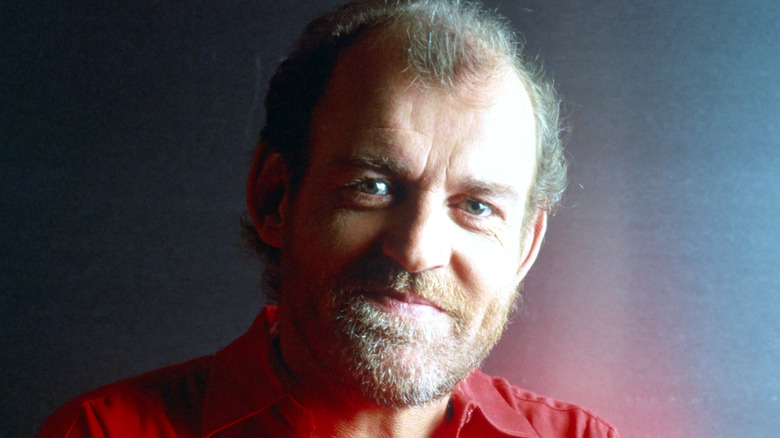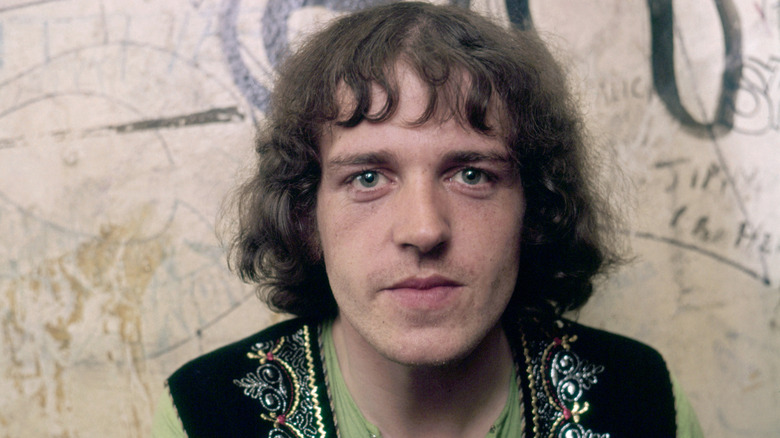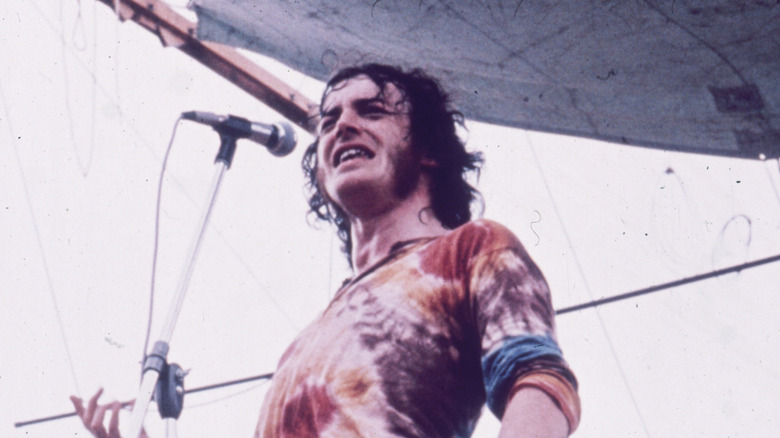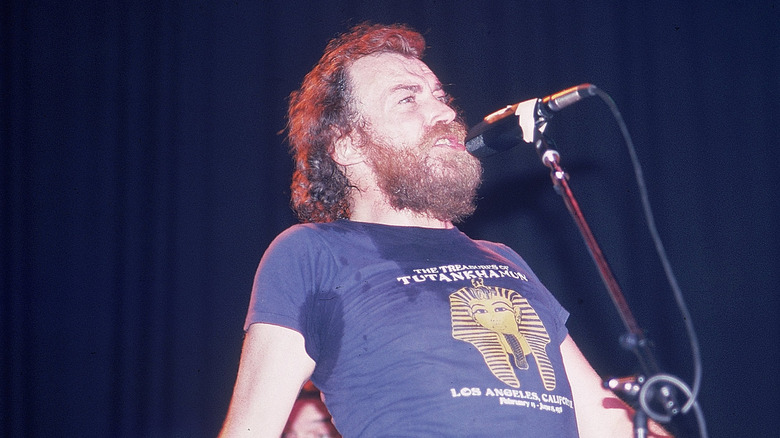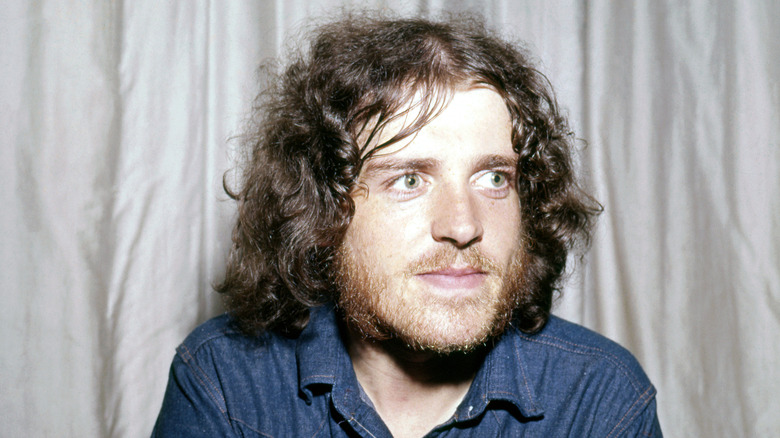The Hidden Truth Of Joe Cocker
Joe Cocker just might be the most singular and distinctive performer in rock history, with a style, mystique, and journey to iconhood all his own. Born and raised in the U.K., he came up through the pub band tradition while embracing and exuding enchanting elements of American blues. Then, through a quirky and unpredictable stage presence and radical interpretations of the well-known songs of others (particularly those of the Beatles), he and his raspy, soulful voice became associated with the countercultural hippie generation. And then, unlike most other major acts of the Woodstock era, Cocker was able to stick around. He evolved and experimented with this style, which allowed him to score hits on the singles chart until well into the 1990s.
A 20th century legend who died at the age of 70 in 2014, more than a decade before his induction into the historically controversial Rock & Roll Hall of Fame, Cocker's life and work are a bit under-examined. Here's a look into the wild, meandering, and impactful life of the embodiment of the rock 'n' roll singer and spirit, Joe Cocker.
Joe Cocker started playing in bands at 12
Well before he was a rock star named Joe Cocker, he was a kid named John Cocker. Friends and family in his hometown of Sheffield, England, started calling the future star Joe when he was still a child. He thought that the nickname came from his favorite pasttime of pretending to be a cowboy named "Cowboy Joe." His friend and neighbor John Mitchell recalled the pair lifting the name from a local window washer named Joe, who struck quite the image lumbering down the street with his ladders and equipment. They both adopted the names "Joe" Mitchell and "Joe" Cocker."
When he was 11, a craze for skiffle music hit the U.K., and Cocker devoured records in the folky, country-and-rock-adjacent style, while his older brother Vic formed a skiffle group. When Joe was 12, a member of that band suggested Cocker be their singer. By early 1960, he'd be the lead singer and drummer for a band called the Cavaliers. Just over a year later, the 17-year-old Cocker was playing pubs around northern England as the pseudonymous frontman of Vance Arnold and the Avengers. Finally going by his mostly real name in 1964, Cocker's first solo song, "I'll Cry Instead," flopped. He co-wrote the first single, "Margorine," from his 1969 album, "With A Little Help From My Friends." It was also a commercial misfire, peaking at No. 48 in the U.K. and missing the American charts entirely.
Cover songs and Woodstock made Joe Cocker famous
The prevailing movement in rock music in the late 1960s and early 1970s was that artists were expected to write their own material, as a nod to their artistic integrity and authenticity. Joe Cocker bucked that trend. Following the failure of "Marjorine," he went all in as a covers artist, remaking and reimagining the well-known or established tunes of other musicians and making them his own. His interpretation of the Beatles' old-fashioned music hall number "With a Little Help from My Friends" as a bombastic, howling blues-rock song went to No. 1 in the U.K. and hit No. 68 in the U.S. That placement belies Cocker's profile in America — his electric performance of the song in 1969 at Woodstock, which was, at the time, the largest music festival ever, made the previously obscure British blues singer a star virtually overnight.
Subsequent Cocker takes on popular songs sold a lot of copies, too, including his version of Dave Mason's "Feeling Alright," Leon Russell's "Delta Lady," the Beatles' "She Came in Through the Bathroom Window," and "The Letter." Cocker's bluesy cover of that Box Tops smash would stand as his biggest hit for years, going to No. 7 in the U.S. One of Cocker's last successes came in 1987, a cover of "Unchain My Heart," a song made famous by his idol, Ray Charles.
The reason for Joe Cocker's performance style
As famous as Joe Cocker was for his voice, he was equally known for his stage presence. As he sang, he'd jerk, tremble, and shake, arrhythmically and lacking predictability, and contort his body into odd and uncomfortable positions. Such movements became pivotal to any impression of Cocker, such as the one performed by comedian John Belushi on "Saturday Night Live."
Cocker's outsider dancing was borne out of an impression of his own, as well as creative embarrassment. "I never played organ or piano or guitar, so it was more out of frustration and me just trying to impersonate in a way. I did it subconsciously," Cocker told the Broward Palm Beach New Times in 2012. "People mistook for me being ill, like I had palsy. I'm not nearly so demonstrative now, but I still have my own way of feeling the rhythm."
The musician also believes he was inspired by Christian worship services. His movements were especially pronounced when he performed at Woodstock. "The crowd was all doing other things until we did 'Let's All Get Stoned,' the old Ray Charles number, and that kind of woke everybody up a bit," Cocker recalled. People say, 'Well, you look a bit gazongo,' but it was like a gospel thing where you'd get so caught up in it, it's like swooning in the church."
He had a lot of problems with substance abuse
Throughout the 1960s and 1970s, Joe Cocker was dogged by speculation that his curious and erratic stage moves were the result of abuse of alcohol and drugs. Indeed, Cocker endured profound addictions to substances throughout his adult life, and while he'd attain lasting sobriety in the early 1980s, Cocker was known to perform while intoxicated or during the process of becoming intoxicated.
Following a sustained period of breakout success in the late 1960s, Cocker didn't record or perform much music in the first part of the 1970s. In June 1974, a highly-anticipated comeback concert was planned for the singer at the Roxy theater in Los Angeles. Intended to be a one-night-only affair in front of an appreciative and supportive audience of Cocker associates, it instead showcased just how troubled the musician had become. "Cocker embarrassed and saddened his closest friends in the music business with a rambling, incoherent fiasco," critic John Rockwell reported in The New York Times.
That night, Cocker had trouble both standing up and remembering the lyrics to his catalog of hits if he could physically even sing them. At one point, he vomited during the show (a common occurrence in the '70s for Cocker), and at another, sat on the stage in silence while the band played "With a Little Help From My Friends."
By 1977, however, he was slowly making his way back, starting with another show in LA. According to Rolling Stone, though he showed up on stage holding a beer and behaving oddly, fans, friends, and record executives were pleasantly surprised once he started singing. Elektra/Asylum, Chairman of the Board Joe Smith said, "We saw that he was performing, and not falling down. It seemed he had pulled himself together. Now it was just a question of putting it on record."
If you or anyone you know needs help with addiction issues, help is available. Visit the Substance Abuse and Mental Health Services Administration website or contact SAMHSA's National Helpline at 1-800-662-HELP (4357).
